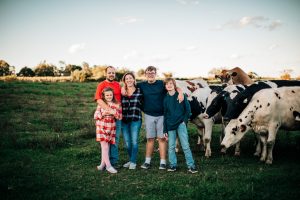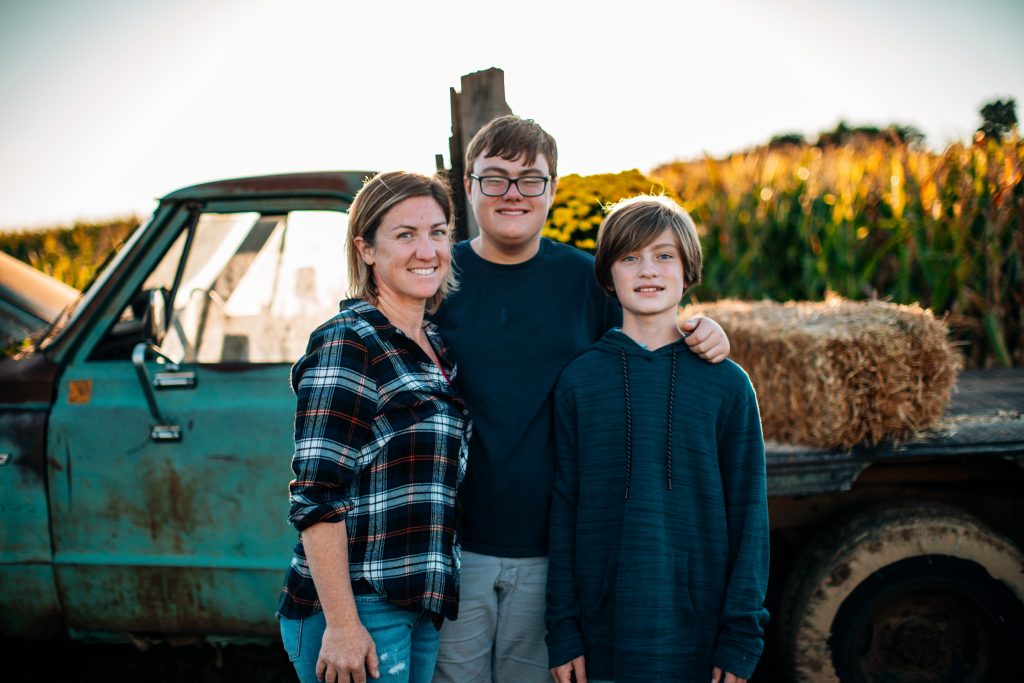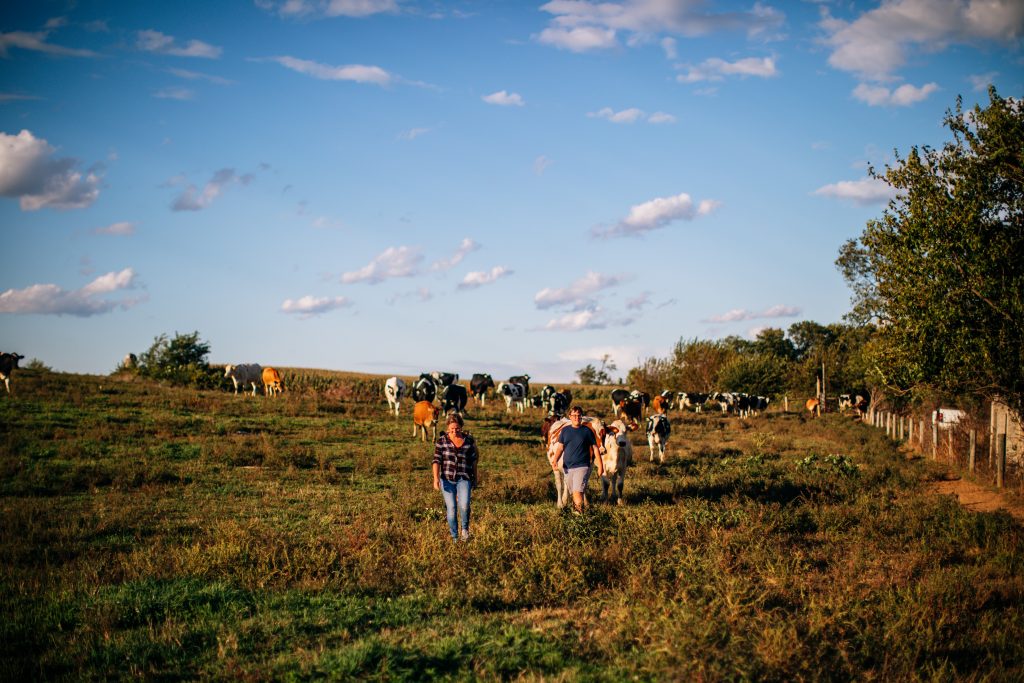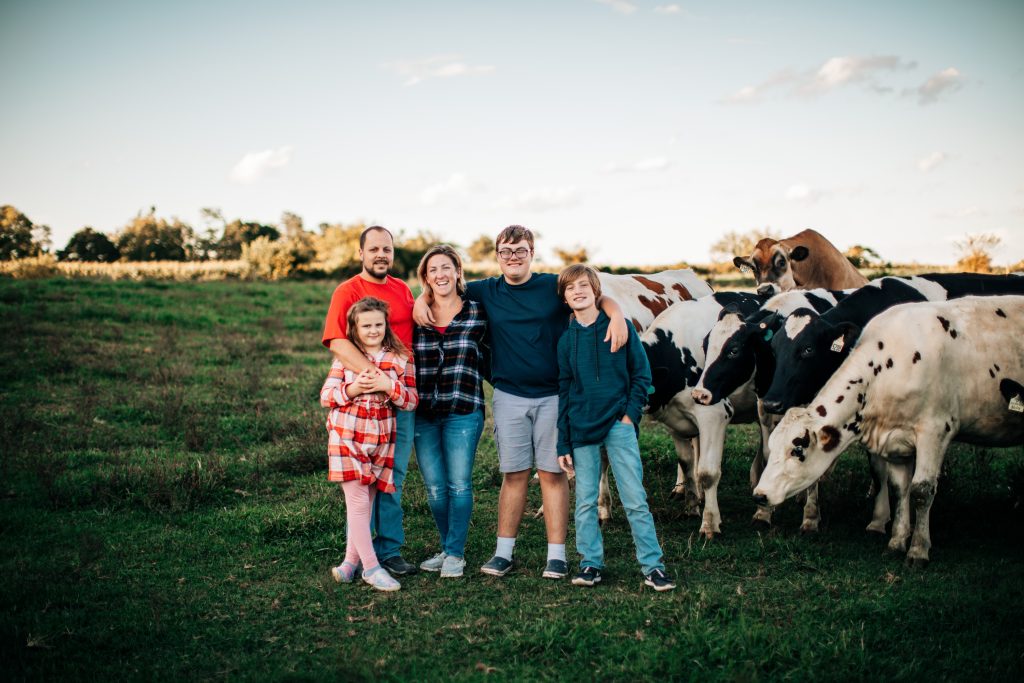
Originally published in Hoard’s Dairyman
“I’m continuing to work on where I want to be five years from now.”
Like many dairy farmers, Amy Brickner of Stover Farms in Cumberland County, Pennsylvania grew up feeding calves with her grandmother and left for college thinking she wouldn’t return to the farm. But after spending a few years away from the farm, she felt the farm calling her back home. She decided it was her destiny to create an on-farm store that helped consumers learn where their food comes from. That’s how Destiny Dairy Bar at Stover Farms was born.
What started as an idea to add value to her family’s dairy operation and connect with her community turned into years of hard work and diligence to bring her vision to life. Amy began working as the herd manager on the dairy farm in 2012 and felt even then that the value-added space was the right direction for the operation instead of increasing the herd size.
“We weren’t going to get bigger, and we weren’t going to have efficiencies of scale here at our current location. I didn’t want to manage more cows and more people,” she shared.
Amy condensed the herd to 80 cows – enough to still ship most of her milk to a dairy cooperative – and began using her background in education and research to apply for grants and visit other value-added facilities. She received the USDA Value-Added Producer Grant during the heart of the pandemic, and it took two more years to finally open Destiny Dairy Bar in 2022.
“I always wanted to do some kind of on-farm store. I took personal tours to farms around Pennsylvania, up in New England and in the Southeast looking at other places farther away that were processing their own milk, selling ice cream or doing other agritourism,” Amy said. “I always enjoyed teaching, so I thought doing tours and events where people could see where their food comes from was the direction I was being pulled in to be able to stay in the dairy industry.”
Two years into the business, Amy bottles her own milk in various flavors and manages most aspects of the business herself in addition to one full-time herdsman, her mom and grandmother. She also recently hired a trained chef to explore cheese-making and help host farm-to-table events. While Amy will be the first to share her long list of dreams and ideas for Destiny Dairy Bar, she says her business actually began by figuring out the simplest first step: bottling milk.

Taking the first step
With the simplicity and versatility of milk, Amy started her value-added business by bottling milk in various innovative flavors such as Everett’s Milky Way, Cookies and Cream, Orange Cream and more.
“Milk was just what was easiest, and I’m 100% about that. It took the least amount of equipment and the least amount of space to get going. Milk is super versatile. So I looked at it and thought, why can’t we get milk in different exciting flavors?” she shared. “To make it a niche product, I got a bunch of extracts and worked on making a creamy, delicious, fun-tasting milk that you could feel good about drinking.”
Amy also forged a partnership with a local creamery a few miles from the farm that helped her bottle her milk from the start. She was able to bottle the milk there without having a creamery on site, while she navigated the permitting and installation of processing equipment on her farm. Last summer, she worked with the creamery to start making her own ice cream as well.
In addition to dairy products, Amy sells Wagyu cross beef and hosts small, on-farm barbecue events with a local vendor who uses her meat to make brisket sandwiches. Amy has found that hosting these types of on-farm, community events, and selling these types of products, involves detailed decision-making at both the herd level and customer-facing level of the business.
“When I converted the herd to A2, any cows that were A1 automatically got bred to a high Tajima Wagyu bull. I received some good advice from Wagyu breeders in Canada as well as the U.S. on what to do and how to market it,” Amy explained. “I’ve started small with this, but it’s creating quite a following. I can see the enthusiasm for it growing. High-end beef is hard when you’re in a recession, but we’re going to start farm-to-table dinners with another local business, a Pennsylvania cheese shop that’s right in town called the Central Wedge Cheese Shop.”
Amy has made a lot of her ideas a reality, but it hasn’t always been a clear road. Working primarily as a one-person team and having people tell her that her ideas are too big have been a challenge over the years. They have also fueled her to keep going.
“As a one-person team, it’s hard because you always have emergencies on the farm. I knew from the very beginning when I wrote my business plan that I had a list of things I wanted to do. I had my end goal in mind, and when you start a business, most people will look at you and say, ‘Do one thing and do it well,’” she said. “I couldn’t explain to them that, yes, I would start with one thing, but I always had the end goal of where I wanted it to lead to.”

Diving into business planning, marketing and new technology
With so many ideas, business planning has helped Amy stay the course and not waver on her vision for the future – while revising the plan over time to match new goals and opportunities. As she brings more people into the business, it also helps them understand her business’s journey.
“Writing a business plan has been great for me because it helps me get back on track. It’s always there in the drawer for me to revisit, see how my business has progressed, and then get myself back on track,” Amy added. “I’m almost finished making my second full revision to the business plan. I received a grant to work with business consultants to redo my budget. As I bring other people into the business, it’s not always easy for me to show them where I’ve come from and where I want to go. I can’t open my brain and just give it to them, so having the plan is a good place to start.”
Amy has received professional consulting grants from the Center for Dairy Excellence to work with outside experts to not only create a business plan, but hold herself accountable.
“The consultants gave some legitimacy to the process since they have seen more behind-the-scenes details from other businesses similar to mine. They could give their perspective on what other people have done. It was kind of a check and balances on the things that I’m pouring my heart into,” she shared. “As I go forward into more loans and grant applications, I feel like it’s the document I need most of all to put some accountability on myself. It’s proof that I am continuing to work on where I want to be five years from now.”
As a dairy farmer at heart, there were certain aspects of managing a value-added business that took time and energy Amy didn’t always have. Working with experienced consultants in the business, financial and value-added spaces was crucial to her business’s growth. For example, Amy has spent time in the last year learning Google Analytics, email marketing, how to track clicks using a QR code and more through a Marketing and Branding grant she received through the Center thanks to funding from the Northeast Dairy Business Innovation Center.
“Even though I took some business classes, I was completely unprepared when it came to actually using QuickBooks the correct way, managing finances, invoicing and all those other intricate things that you have to do on a weekly basis. For marketing and advertising, the marketing grant that I’m getting now is affording me so much knowledge that I just couldn’t get otherwise,” she said. “For me, consulting grants are really about knowledge as much as money. It’s a chance to learn as much as you can and soak up as much advice from the experts. Otherwise, I would probably put certain projects on the back burner again.”

Being honest with yourself
Opening a value-added business takes heart, soul and creativity, but it also takes diligence and focus to build a profitable business. Throughout her journey, Amy has learned that it involves being honest with yourself about your strengths and weaknesses, including your ability to connect with customers, market your products, manage the financials, care for your herd, and so much more.
While Amy says her business is just beginning, she shared a few pieces of advice with other dairy producers who might have big ideas for impacting their community with value-added products:
- Keep an open line of communication with the community. “Having the ability to talk to kids and consumers before they might get a bad impression of production agriculture is incredibly important. Too easily, they can get the idea in their heads that we mistreat our animals or the environment and we don’t care. It’s really about keeping open lines of communication. Not every farmer can do this type of communicating, and I completely understand that. But I feel like I can and I should.”
- Utilize industry resources and learn from others. “Use all the resources available to you and ask a lot of questions. Find other people who are doing it and ask who they got advice from. Whether it be the Center for Dairy Excellence or your local land grant colleges, use your resources. I know Penn State has a lot of courses and webinars, too.”
- Be honest about your strengths and abilities. “One of my consultants would tell me, ‘If you don’t want to deal with customers, you might not want to do this.’” Even if you just stay in the back and make cheese, somebody is still going to have to sell it. If you’re not that person, or if you don’t have that person on your team, maybe just stick to being a dairy farmer.”
- Find what renews your spirit on hard days. “After dealing with what seemed like a really long winter and lots of family issues, I’m kind of burnt out. But the great thing is that I love my customers. Not only do I love my repeat customers and my regulars, but I love the new people who come in. Sometimes I force myself to go into the store because it’s one of the biggest things that makes me happy on a hard day.”
To learn more about grant opportunities available through the Center for Dairy Excellence, along with business planning resources for dairy farmers, visit www.centerfordairyexcellence.org.

